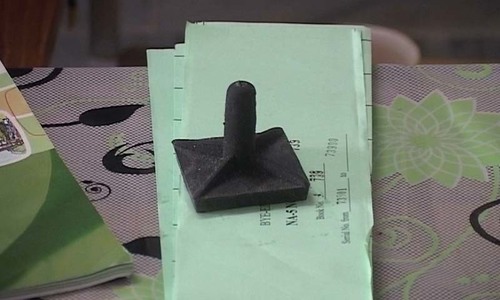ADIALA Jail’s newest inmates, former prime minister Nawaz Sharif, his daughter Maryam and son-in-law Capt Safdar, may not be able to vote in the upcoming general elections scheduled for Wednesday.
According to the guidelines of the Election Commission of Pakistan (ECP) and schedule, “inmates, government officers (including armed forces), holders of public office and their families can avail the postal ballot facility” — but the last day to submit postal ballot applications was July 10.
Section 93 of the Election Act 2017 adds that “the out-stationed voters, who cannot reach to the polling station in person, can cast their votes for the National Assembly and Provincial Assemblies through postal ballots”.
It goes on to explain that those allowed to vote via postal ballots are not entitled to vote in person at the polling station.
Other inmates
However, the former first family won’t be the only inmates who can’t vote this year — they will be joined by more than 17,000 prisoners in Sindh and many more across the country.
Talking to Dawn at the Central Jail for Women, Karachi, former Sindh IG Prisons Nusrat Mangan said that there were 4,710 prisoners at Karachi Central Jail and no one had come to collect their votes yet.
He claimed that they had reached out to the ECP but nothing had been done so far, whilst explaining that the process of inmates casting a vote is arduous. “A letter or application is written to the prison staff which is then sent to the Returning Officer (RO) and once processed, a postal ballot is sent to the jail,” he said. Postal ballot forms are also available on the ECP website and can be obtained from the RO of the constituency of the voter.
I am afraid the date to apply for postal ballots has already passed. It is safe to say that Mian Nawaz Sharif and Maryam Nawaz won’t be able to vote. Pildat Executive Director Ahmed Bilal Mehboob
According to Mr Mangan, the prison staff usually receives all postal ballots 10 days to a week before elections are scheduled. “The ROs bring the ballot papers with them and take an entire day to collect the votes of prisoners who are eligible to vote,” he said. “It is a lengthy process. Not everyone can vote. Many inmates don’t even have CNICs or know their constituency or candidates, you know,” he added.
At the women’s jail, Assistant Superintendent Humaira said they hadn’t received any postal ballots either.
“I don’t think we ever have,” she mused. The women’s prison is home to 122 women and 20 children.
In Rawalpindi, however, more than 400 convicted and under-trial prisoners from Adiala Jail applied for postal ballots while another 400 prisoners from across Khyber Pakhtunkhwa also did the same.
Pakistan Institute of Legislative Development and Transparency (Pildat) Executive Director Ahmed Bilal Mehboob said that while inmates were allowed to vote, “I am afraid the date to apply for postal ballots has already passed. It is safe to say that Mian Nawaz Sharif and Maryam Nawaz won’t be able to vote.”
83,000 is the total number of prisoners in Pakistan, according to a report by the International Committee of the Red Cross.
“All prisoners who are over the age of 18 are eligible to vote,” he added. “But obviously they also have to be registered to vote. In most cases this is automatic as a CNIC means you are registered. While 90 per cent of the total inmates are entitled to vote, not many do.” He explained that according to reports related to the elections, the total number of people who actually use postal ballots is quite insignificant.
Mudassar Rizvi of the Free and Fair Election Network (Fafen) reiterated that legally speaking, prisoners had the right to vote via postal ballots, clarifying that earlier, this facility was not provided and they had to cast their vote in prison.
“The deadline for the postal ballot applications has passed so the ECP would have to issue some provision to factor in certain people who went to jail after their deadline,” he said. He referred to a report by the International Committee of the Red Cross, which claimed that there were more than 83,000 prisoners — pre-trial, remand, and under-trial — across Pakistan.
A source at the ECP confirmed the observations made by Mr Rizvi and Mr Mehboob: the last date to submit application forms for postal ballots was July 15 — it was extended twice. “Since the former prime minister, Maryam and Capt Safdar missed the deadline, it is highly unlikely that they will be able to cast their votes in the upcoming general elections,” he said.
Published in Dawn, July 23rd, 2018
















































Dear visitor, the comments section is undergoing an overhaul and will return soon.